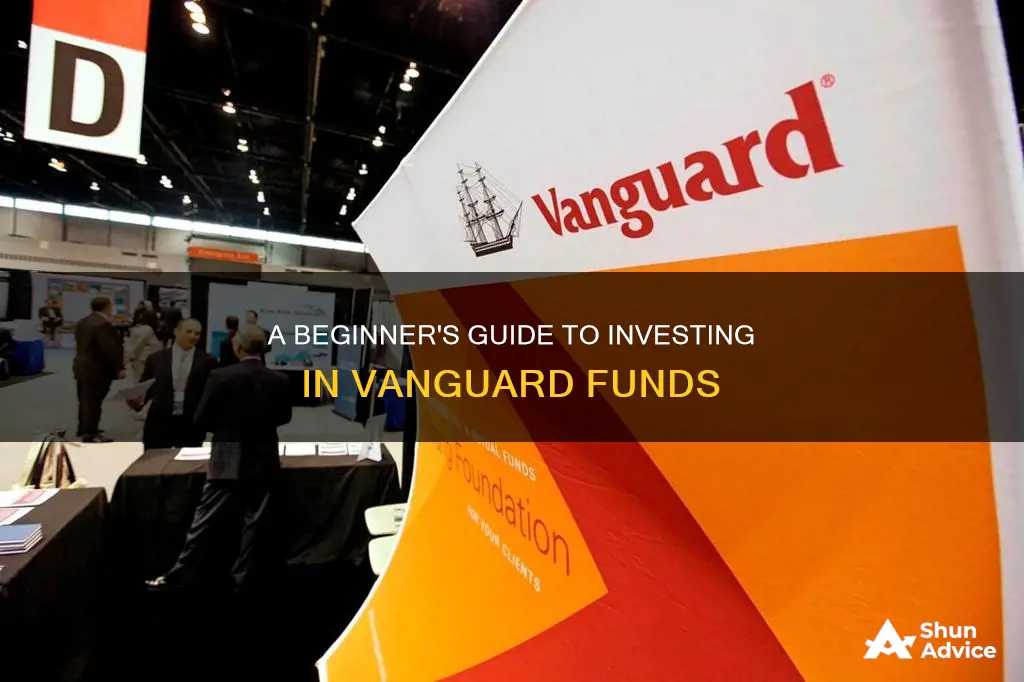
Investing in Vanguard funds can be a great way to meet your financial goals. Vanguard is known for offering high-quality, low-cost exchange-traded funds (ETFs) and mutual funds. When it comes to investing in Vanguard index funds, there are a few things to keep in mind. First, you'll want to understand the basics of risk and return and how they are related to asset allocation and diversification. You should also consider the type of account you want to open, as different accounts have different tax implications and penalties. When choosing specific Vanguard funds to invest in, look at the fund's historical performance, portfolio mix, and fees. You can purchase Vanguard funds directly through their website or through a broker. By following these steps and considering your own financial goals and risk tolerance, you can successfully invest in Vanguard funds.
| Characteristics | Values |
|---|---|
| Initial Investment | $1,000 - $3,000 |
| Annual Costs | Expense ratio of 0.04% - 1.8% |
| Investment Types | Mutual funds, exchange-traded funds (ETFs), stocks, bonds, CDs, money market funds |
| Investment Accounts | Traditional IRA, Roth IRA, taxable account |
| Investment Plan | Asset allocation, diversification, risk tolerance |
| Investment Goals | Retirement, higher education savings, general investing |
What You'll Learn

Understand the basics of risk and return
Understanding the basics of risk and return is essential when investing in Vanguard funds. All investments carry some level of risk, and different types of assets have different levels of risk and potential reward. The three main types of assets—cash, bonds, and stocks—each have varying degrees of risk and potential returns.
Cash, or short-term reserves, offer the most stability, and you are unlikely to lose money with these investments, but the gains will also be minimal. The main risk with cash investments is that the rate at which you earn money could be lower than the rate of inflation, resulting in a loss of value over time.
Bonds carry more risk than cash but less than stocks. The main risks with bonds are that rising interest rates can push bond prices down, and there is a chance that the bond issuer could stop making promised payments or be unable to repay the principal. However, bonds can provide a moderate return with a moderate amount of risk.
Stocks, or shares, carry the most risk but also offer the potential for higher returns. The main risk with stocks is that their prices can drop due to various factors, such as poor company performance or economic concerns. Stock market dips tend to be more significant than those in the bond market.
By mixing different types of investments, you can balance stability and growth potential in your portfolio. Diversification is a key strategy to reduce risk, as it ensures your portfolio is not overly exposed to any one type of asset. Vanguard's Target Retirement Funds, for example, invest in a broad range of US and international stocks and bonds to manage risk while growing your retirement savings.
Additionally, when investing in Vanguard funds, it's important to consider the costs and fees associated with the funds. Vanguard is known for its low-cost exchange-traded funds (ETFs) and mutual funds. The expense ratio, or the annual cost to maintain the fund, is an important factor to consider, as high costs can eat into your returns.
International Fund Investment: Strategies for Global Portfolio Success
You may want to see also

Choose an investment account
Choosing an investment account is a crucial step in your financial journey, and it's easier than you might think. The type of account you select depends on your investment goals and overall financial situation. Here's a detailed guide to help you choose the right investment account with Vanguard:
Understand the Different Account Types
Before choosing an account, it's essential to understand the various options available. Vanguard offers a range of account types, including general investing accounts, retirement accounts, and education savings plans. Each type of account has different features, benefits, and tax implications.
Identify Your Investment Goals
The first step in choosing the right investment account is to identify your financial goals. Are you saving for retirement, education, a new home, or other short-term or long-term goals? Different types of accounts are geared towards specific objectives, so understanding your goals is crucial in making the right choice.
Retirement Accounts
If you're planning for retirement, Vanguard offers a range of retirement account options. These include Individual Retirement Accounts (IRAs), which are personal accounts that help your retirement savings grow tax-deferred. Traditional IRAs allow you to contribute pre-tax dollars, while Roth IRAs offer tax-free earnings but are funded with after-tax dollars. Both options provide different tax advantages.
Education Savings Plans
If you're saving for future education costs, Vanguard's 529 education savings plans are a great option. These plans are sponsored by states and often come with tax benefits. They can be used for K-12 tuition, college expenses, and other qualified higher education expenses. This type of account allows families to save for their children's or grandchildren's education while taking advantage of tax-free investment earnings.
General Investing Accounts
For those seeking flexibility, Vanguard offers general investing accounts. These accounts can be used for various financial goals, such as saving for a dream home, wedding, or other short-term or long-term objectives. General investing accounts don't have early withdrawal penalties, so you can access your money whenever needed. However, keep in mind that you will need to pay taxes on your investment earnings with these accounts.
Small-Business Retirement Plans
Vanguard also caters to small-business owners and the self-employed with specialised retirement plans. These include options such as a Simplified Employee Pension (SEP-IRA) or an Individual 401(k). If you have employees, you might also consider a Savings Incentive Match Plan for Employees (SIMPLE IRA). These accounts provide tax advantages and help small-business owners and their employees save for retirement effectively.
UGMA/UTMA Accounts
If you want to gift money to a minor, you can open a Uniform Gifts to Minors Act (UGMA) or Uniform Transfers to Minors Act (UTMA) account. These accounts are owned by a minor but managed by an adult until the child reaches adulthood. After that, the money can be used for any purpose, providing flexibility for the child's future.
Trust Accounts
Trust accounts are legal arrangements where a third party, known as the trustee, manages assets on behalf of the beneficiaries. These accounts are often used as part of estate planning to minimise or eliminate estate taxes.
Use Vanguard's Tools and Resources
If you're unsure which account is right for you, Vanguard offers helpful tools and resources. You can use their Quick Start tool or account identification tool to identify the account that best aligns with your investing needs and goals. Additionally, you can explore their website to learn more about the various account types, fees, and investment options available to you.
Mutual Fund Strategies: Long-Term Investments for Beginners
You may want to see also

Learn about asset allocation
Asset allocation is a key part of investing and can have a big impact on your long-term returns. It's about dividing your money between different types of assets, such as stocks, bonds, and cash, to create a well-balanced investment portfolio. The goal is to generate returns while managing risk.
When deciding on your asset allocation, it's important to consider your investment goals, time frame, and risk tolerance. For example, if you have short-term financial goals, such as buying a house in the next year, you may want to choose less volatile investments like bonds and cash. On the other hand, if you have long-term goals like retirement, you can invest more in riskier assets like stocks, which have the potential for higher returns.
Vanguard offers LifeStrategy Funds, which are designed to help you manage risk while growing your savings. These funds have a set percentage of stocks and bonds to match your comfort level and investment objectives. For instance, the LifeStrategy Income Fund focuses on current income with limited growth potential and lower exposure to stock market risk, while the LifeStrategy Growth Fund targets long-term growth with higher exposure to stock market risk.
You can also build a diversified portfolio with Vanguard ETFs. They offer four funds: Vanguard Total Bond Market ETF, Vanguard Total International Bond ETF, Vanguard Total Stock Market ETF, and Vanguard Total International Stock ETF. These funds provide exposure to different asset classes, helping to reduce risk and potentially generate higher returns.
Remember, investing comes with risks, and there is no guarantee that a specific asset allocation will meet your investment objectives. It's important to do your research and choose investments that align with your financial goals and risk tolerance.
Vanguard Funds: Best Investment Options for Your Portfolio
You may want to see also

Explore Vanguard's investment products
Vanguard is a well-known investment company that offers a wide range of investment products, including mutual funds, exchange-traded funds (ETFs), stocks, bonds, CDs, and money market funds.
Mutual Funds
Vanguard offers a variety of mutual funds, which are pooled collections of assets like stocks, bonds, and other securities, priced once per business day. Vanguard's mutual funds are known for their high quality and low costs, and are often recommended by analysts. The company offers various funds to choose from, including the Vanguard 500 Index Fund, Vanguard Total Stock Market Index Fund, and Vanguard Growth Index Fund. Most Vanguard mutual funds have a minimum investment of $3,000, but some funds, like the Vanguard Target Retirement Funds, have a minimum of $1,000.
Exchange-Traded Funds (ETFs)
Vanguard also offers a range of ETFs, which are similar to mutual funds but trade on an exchange like the New York Stock Exchange and change price throughout the business day. ETFs are considered more tax-efficient than mutual funds. Vanguard's ETFs are known for their low costs, and the company offers dozens of options to its clients, including the Vanguard S&P 500 ETF, Vanguard Russell 2000 ETF, and Vanguard Total Stock Market ETF. The minimum investment for Vanguard ETFs is just $1.
Stocks, Bonds, CDs, and Money Market Funds
In addition to mutual funds and ETFs, Vanguard allows investors to invest in individual stocks, bonds, CDs (certificate of deposits), and money market funds. These investment options provide diversification and can be tailored to an investor's specific goals and risk tolerance.
Choosing Vanguard Investment Products
When exploring Vanguard's investment products, it's important to consider your financial goals, time horizon, and risk tolerance. Vanguard offers resources like the Quick Start tool to help investors choose the right products for their needs. It's also essential to understand the basics of risk and return and how they relate to your investment choices. Additionally, investors should consider the costs associated with each investment product, including expense ratios and account fees.
By taking the time to understand Vanguard's investment products and conducting thorough research, investors can make informed decisions that align with their financial goals and investment strategies.
A Guide to Investing in Paytm Mutual Funds
You may want to see also

Compare advice options
Vanguard offers a range of advisory services to help investors from their first investment through retirement. These services are designed to meet the needs of investors with different levels of financial management needs and investment amounts. Here is a comparison of the advice options available:
- Vanguard Digital Advisor: This is a robo-advisor service that offers automated investing with ETF-based portfolios. It provides guidance on saving for retirement, options to add custom goals, and debt strategies to pay off debt faster. The minimum investment required to qualify is $1002, with an annual advisory fee of approximately $15 per $10,000 invested.
- Vanguard Personal Advisor: This is a hybrid service that offers access to professional financial advisors and ongoing personal financial planning. It also provides automated investing options and support for various planning topics such as tax strategies, withdrawals, and debt management. The minimum investment is $50,000, with an annual advisory fee of approximately $30 per $10,000 invested.
- Vanguard Personal Advisor Select: This service provides custom investment and financial planning strategies, including a dedicated Certified Financial Planner™ (CFP®). It offers portfolio stress-testing against thousands of scenarios and a personalized plan based on 30+ data points specific to the investor. The minimum investment is $500,000, with an annual advisory fee of no more than $30 per $10,000 invested.
- Vanguard Personal Advisor Wealth Management: This service is designed for investors with $5 million or more in assets. It includes all the benefits of Personal Advisor Select, along with advice from a dedicated CFP, exclusive investing solutions, and wealth and estate planning. The annual advisory fee is no more than $30 per $10,000 invested.
When choosing an advice option, investors should consider their investment goals, financial situation, and the level of personalized advice they require. It is important to evaluate the costs and benefits of each service to determine which one aligns best with their needs and investment strategy.
Municipal Bond Funds: When to Invest for Maximum Returns
You may want to see also
Frequently asked questions
Opening a Vanguard investing account is free and easy. It should only take around 5-10 minutes. Start by choosing "Open an account" from the menu, then select "Start your new account". Most investors fund their new accounts with an electronic bank transfer.
At Vanguard, you can invest in various investment products, including mutual funds, exchange-traded funds (ETFs), stocks, bonds, CDs, and money market funds.
From the Vanguard homepage, search for "Buy funds" or go to the Buy funds page. After logging in, scroll to find the account that you'd like to use for your purchase and select that account. Once you've selected the checkbox next to an existing fund, enter the fund information (name, ticker symbol, or fund number) and the dollar amount you want to purchase. Then, select your funding method and review the details of your transaction before submitting.
Vanguard does not charge a fee to open your account or a commission to buy or sell Vanguard mutual funds or ETFs online. There is, however, a $25 annual account service fee for each brokerage and mutual fund-only account. Most Vanguard mutual funds have a $3,000 minimum, but you can invest in any Vanguard Target Retirement Fund or Vanguard STAR® Fund with as little as $1,000. The minimum investment for Vanguard ETFs is $1, and for non-Vanguard ETFs or other individual securities, it's the market price of one share.







